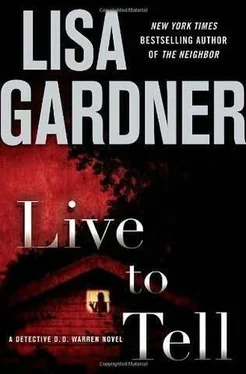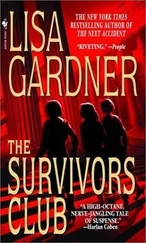Now I found myself thinking of Sheriff Wayne again. But I refused to cry, because that would be stupid.
Lucy finally stirred. She raised her head, blinked her eyes, regarded us owlishly.
Quickly, before she was awake enough to fight, Greg and I tucked her between us and hustled her to the elevators.
I was still thinking of too many things. That it was three days away. That it shouldn’t matter anymore. A date on a calendar, a day that rolled by once a year. And I knew Karen had finally figured out my schedule, why I’d been logging so many hours. Because the date did matter, somehow it always mattered, and in another twenty-four hours or so, I’d have to disappear. I wouldn’t be fit for the kids. I wouldn’t be fit for adults.
And I certainly wouldn’t be fit for a decent guy like Greg, who’d want to hold me and make it all better.
Once a year, I didn’t want it to be all better.
Once a year, I liked honing my rage.
Because I am the lone survivor, and I’m still pissed off about that.
The elevator took us up to the eighth floor. I waved my ID to enter the lobby. Karen was waiting for us, but not alone. A blonde woman with curly hair and a salt-and-pepper-haired man in a charcoal-colored suit stood beside her. Both were holding out police shields.
“Danielle,” Karen began.
And I knew, right at that moment, that it had started again.
VICTORIA
What does it feel like for a father to leave his child? Does he wake up in the morning remembering his son’s first smile? Maybe the way his baby used to fit in the curve of his arm, solemn blue eyes peering up, rosebud lips pursed thoughtfully?
Does he remember the first time his boy said “Daddy”? Or the way Evan used to run to the door and throw his arms around his father’s legs?
Does he torture himself with the what-ifs, the might-have-beens? The vision he had of one day coaching his son’s soccer team? The dream of attending their first Patriots game together, or maybe cheering for the Celtics at the Garden? Does he consider the gaping hole in his future where the driving lessons, man-to-man talks, and first shave should’ve been?
Does he know that in the days and weeks afterward, Evan fell asleep still crying for the father who never came?
When Michael and I finally brought Evan home from the NICU, we were convinced the worst was behind us. He sat up at three months. Crawled at ten months. The pediatrician was impressed.
He cried, sometimes for hours at a stretch. Sleep was difficult, naptimes nearly nonexistent. I read books on various sleep techniques while reporting the challenges to the doctor. Babies cried, he assured me. Evan wasn’t exhibiting any signs of colic and was steadily gaining weight, always a concern with a preemie. As far as the medical experts were concerned, Evan was fussy but fabulous. Michael and I took that to heart. This was our son, our parenting experience, fussy but fabulous.
Michael was hands-on in those days. When he came home from work, he’d take his turn pacing the house with Evan crying against his shoulder. He’d encourage me to take some time for myself. Read a book, indulge in a bubble bath, take a nap. Together we could handle this.
At fourteen months, Evan made the transition from crawling to running. Suddenly, he slept much better at night, maybe because he raced around like a rocket all day. I went from endlessly soothing a baby to frantically chasing a toddler. Evan didn’t seem to have a sense of his own space. He ran into walls, fell off chairs, and walked in front of moving swings. At the playground, he was a threat to himself and others.
He didn’t fear strangers. He didn’t believe other kids ever wanted to play alone. He ran into groups, elbowed his way into other children’s sandboxes. He had this hundred-watt smile and these brilliant blue eyes. At fourteen months, it was as if the world already wasn’t big enough for him. He had so much to do, so much to see, and so much to say.
An older woman once sat beside me on a park bench just to listen to the magic of Evan’s laughter as he rolled in a pile of fall leaves.
“He is an old soul,” she told me before leaving. “A very old soul. Watch him. Listen to him. He will teach you what you need to know.”
Around this time Evan stopped wearing clothes. He’d always cried if we dressed him in anything other than cotton. Now he refused even that. I found shirts, socks, pants, diapers strewn down the hallway, and sometimes across swing sets. I put the clothes back on. He took them back off.
We stayed home more often; naked eighteen-month-olds weren’t always welcome at a public park.
Evan also started some new and alarming habits. For example, he took to climbing onto the kitchen counter so he could play with the knives. He liked to hold them by the blade, as if he needed to slice open his palms in order to understand how sharp the edges were. The same went with the stove. I gave up cooking unless Michael was home. Evan was obsessed with the burners. The more we told him they were hot, the more he needed to place his fingers across the glowing red coils.
It was like living with a bull in a china shop. One day he broke all the eggs in the kitchen in order to hear how they would sound (I was on the phone). The next afternoon, he smashed every bottle of perfume I owned against the tile floor, to see how far the glass would shatter (I was in the downstairs lavette). I caught him climbing the china cabinet one afternoon, and wisely padlocked the doors (I’d been in the shower, but realized I couldn’t hear Evan and went bolting through the house in nothing but a towel).
We saw our first expert, a child development specialist. We received our first diagnosis. Evan suffered from global Sensory Integration Disorder; his brain was properly receiving input from his five senses, but could not prioritize the sensations. Meaning he existed in an overstimulated state-a full cup, the specialist explained to us, where each new sound, scent, touch, smell, and taste was another drip, drip, drip into an overflowing vessel. Some things he could not tolerate at all: the rasp of a zipper, the feel of denim. Other sensations he fixated on, trying to get them to penetrate the clutter of his brain-what is sharp, what is hot, what is pain. He was like a moth, drawn to the flame.
Evan started to receive occupational therapy. Michael agreed that I needed help, so we hired our first in a string of what would become fourteen part-time nannies.
I went on walks to clear my head and refresh my body. Then I came home to my crazy, exuberant wild child. He would bowl me over with his hugs. Light up the world with the exuberance of his laughter. We would wrestle, tickle, and play endless games of hide-and-seek.
Then he would scream over having to brush his teeth. Or fly into a rage over having been served pasta on the wrong-colored plate. He threw one of Michael’s golf balls through our family room window when we asked him to put on shoes. He slapped me across the face when I told him it was time for bed.
Our first nanny quit, then the second, the third.
When Evan was happy, he was so happy. But when he was angry, he was so angry, and when he was sad… he was so, so sad.
We received our second diagnosis: Mood Disorder NOS (Not Otherwise Specified). At four, we put him on clonidine, a drug generally used with ADHD to help moderate impulsive and oppositional behavior. We hoped the clonidine would take off the edge, allowing Evan to find some measure of self-control.
He improved in the short term. Slept better at night. Less manic during the day. Between the clonidine and a one-to-one aide, it appeared he might survive preschool.
Time, Michael and I told ourselves. Evan just needed time. Time for the occupational therapy to assist with the hypersensitivity. Time to better develop his own coping skills. We had challenges, but all parents had challenges. Right?
Читать дальше












